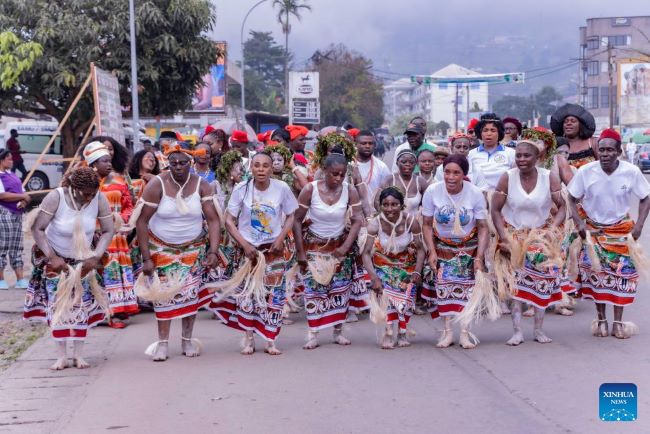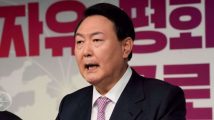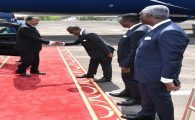Privacy Overview
This website uses cookies so that we can provide you with the best user experience possible. Cookie information is stored in your browser and performs functions such as recognising you when you return to our website and helping our team to understand which sections of the website you find most interesting and useful.


















2, June 2018
Southern Cameroons chilling tale 0
Thirty-five-year-old Obot Ayuk, a cocoa farmer and father of three in Southern Cameroon town of Kembong which shares borders with Nigeria, watched helplessly as soldiers wreaked havoc in the community. He saw houses burning with elderly people in them. Farmlands were destroyed, women raped and about 11 unarmed civilians, including three teenagers were killed in one fell swoop.
Now an internally displaced person (IDP) in one of the camps in Douala, Cameroon’s economic capital, Ayuk told our correspondent that his village had turned into a ghost town with goats and other domestic animals occupying homes. He had fled to Douala through the forest and was still searching for his wife and three children.
He said: “They invaded our villages, raped our women, burnt down houses and looted properties. They said we were hiding Ambazonian fighters, and for that reason, they would kill us all. Since October last year, we have not known peace in Kembong. The village has become desolate and our farmlands have been destroyed.
Ayuk wondered how a government would do things like these to its people and still claim that the country is one.
He added: “In one fell swoop, the army murdered about 15 people, including three teenagers. People watched helplessly as their loved ones were killed by French-speaking soldiers. The only offence of the murdered people was that they were Anglophones.
“As I speak to you, I do not know where my wife and children are. I do not know where the rest of my family is. What kind of life is this? Why can’t they go after the Ambazonian warriors themselves? Why kill innocent civilians and tag them terrorists? I wonder why the world is keeping quiet to this carnage in Southern Cameroon.
“I came to Douala through the forest in February. These killings started September 28 last year. That was a few days after the secessionists announced breakaway from La Republique Du Cameroun (Republic of Cameroon). The next thing, soldiers invaded our community and started killing people.
“At first, I fled to Bakassi. But when the crisis got worse there, I had to return to Kenbong before leaving for Douala through the bush. I have lost everything I have worked for in my entire life.”
The monarch, it was said, lost his only son and heir to the troops three weeks ago after he was alleged to be sympathetic to the cause of the secessionists.
Our correspondent, who was in Cameroon for four days, gathered that no fewer than 61 communities in the southern region had been completely razed since the Ambazonian Separatist Movement (ASM) declared the secession of the Anglophone region from Cameroon last September.
Angered by the action, Cameroon’s President, Paul Biya, had declared total war against the ASM, tagging them terrorists and enemies of the state. Unfortunately, the war has taken a toll on communities and cities in the south, following allegations of gross human rights violations against Cameroonian soldiers deployed to fish out the rebels.
Most of the communities our correspondent visited had become shadows of themselves with charred, mutilated or decomposing bodies everywhere.
There were also video footages showing some persons in military uniform dehumanising civilians. In one of the videos, about four of the uniformed men said to be Cameroonian soldiers, were beating a young man, dragging him in the mud, pouring water under his feet and whipping him with cutlasses. They marched his head with their jackboots and dragged him on the ground until he died.
According to locals, the soldiers, rather than go after the separatists, descended on unarmed civilians, torturing, killing and maiming them on allegations that they were shielding Ambazonian warriors.
A recent report from the United Nations indicated that at least a thousand persons had been killed and over 167,000 displaced as a result of the crisis. Among the affected towns are Kwakwa, Boa Bakundu, Bole Bakundu, Dipenda Bakundu, Big Ngwandi, Bakumba, Bokosso, Nake, Kombone Mission, Kake I, Kake II, Bekondo, Big Massaka, Nganjo, Foe Bakundu, Ekombe, Small Ekombe, Ediki, Kuke, Ebonji, Etam, Nguti, Mongo ndor, Bello, Anjang, Angin, Anyagwa and Azi.
Others include Kumba, Doti Nobi, Kugwe, Ambo, Efah, Kumku, Ashong, Ngie, Ejeke, Mbene, Bati-Numba, Kagifu, Dadi, Gurifen, Muyenge, Bafia, Ekwe, Kumbe-Balue, Ekona Mombo, Batibo, Bafut, Mbalangi, Oshie, Baingo, Bombele Mbonge, Kumu kumu, Bangele, Konye, Guzang, Widikum and Babadiehka.
“For each soldier killed by the rebels, a drone is deployed to level the community where the incident occurred,” said a lawyer who spoke with our correspondent on condition of anonymity.
He added: “Three octogenarian women were said to have been burnt alive in their homes at Kwakwa following their inability to run out when the soldiers ordered people to vacate their residences or risk being burnt with them.
“The government is not handling this issue properly. Rather, it is making us, Southern Cameroonians, to have sympathy for the rebels. I do not support secession, but it is completely unacceptable to kill people, burn down communities and rape women.
“The government has deployed maximum force in the region and the French soldiers sent to the region are too proud. They do not want to work with locals to gain their trust and cooperation. They think they can achieve result by force, and that is why most times, no one gives them useful information.
“The problem did not start today. It is an agitation that has been on for a long time. This agitation is borne out of genuine desire for equal treatment. What the government needed to do was to look at the issues raised and see those that can be addressed immediately. But it chose to deploy maximum force against our people.”
A Cameroonian journalist who led our correspondent round some of the areas said he personally witnessed the dumping of over 80 corpses at the Buea General Hospital mortuary on October 1, last year, adding that the corpses were brought in military lorries.
He said the soldiers seized all the mobile phones of the people at the scene and removed all means of identification from the corpses, most of whom were youths staging peaceful protest with green leafs in their mouths and hands.
To cover up their crime, the journalist said, the soldiers announced that the corpses were those of terrorists who fled Nigeria into the country and were killed in battle.
“I do not think I have seen anything that callous. These were young boys, mostly students, who were staging peaceful protest against marginalisation of Anglophone Cameroon. They had green leaves in their mouths and hands. They had their identity cards in their pockets but the soldiers took them away and passed the deceased off as terrorists from Nigeria.
“Even in Douala and Yaounde, it is a taboo to discuss the issue. If security forces should see images or videos of the carnage in Southern Cameroon on your phone, they will detain you instantly.
“The government has been busy singing unity and oneness. They even built a unification village in Yaounde to mark the Reunification Day celebrated every May 20. Circulars were sent to churches to ensure their services ended latest 8 am on Sunday, May 20. Civil servants across the country were also issued a stern warning to come out that day or risk sanctions.
“This whole tension is crumbling the economy of the country. Our major export is cocoa and much of these cocoa grow in the southern region. With this fight, farmers have fled their homes and farmlands have been destroyed. Nothing is really moving as it should and it bothers me that the government is too proud to consider certain compromises for peace to reign.”
What the agitators want
With the arrest of some government critics by the Nigerian Security forces and their subsequent repatriation to Cameroon on December 31 and February 25, the situation got worse as the people intensified their protest against the regime, demanding the unconditional release of all 48 deportees.
It was gathered that despite the claim by Cameroon’s Minister for Communication, Issah Tchiroma, that the detainees had returned, neither their relatives nor their lawyers have seen or known where they were being kept.
This, our correspondent was told, further worsened the situation, as the rebels were said to have gone after perceived allies of the government in the region.
Locals said the incarceration of alleged separatist leader, Ayuk Tabe, 53, alias Sisiku, and nine others arrested with him in Abuja- Tessang Fombang, 48; Nfor Nfor, 66; Shufai Berinyu, 51; Eyambe Ebai, 49; Fidelis Ndeh-Che, 41; Prof. Cheh Awasum, 50; Dr. Cornelius Kwanga, 47; Dr. Egbe Ogok, 53, and Dr. Henry Kimeng, 50- as well as all those the Nigeria Police rounded up at Gembu, Sarduana Local Government Area (LGA) of Taraba State, was a wrong move.
“The government cannot force unity on anyone. It cannot scream unity from one lip and then use maximum force, intimidation to silence critics. If the government truly wants peace and unity, the first thing it should do is allow those detainees access to their relatives and to lawyers.
“The government should also implement UN Resolution 1608 of 1961, as submitted by the Fourth Committee, A/4737.
“By virtue of the fact that the confederation deal was never conclusive, everything that has been done in Cameroon in the name of unity is null and void ab initio, and must be considered not binding on Ambazonia (Southern Cameroon), which has clearly and effectively proven that there were unpardonable discrepancies in the unity process that has led Cameroon to treat Anglophone Cameroonian masses as second class citizens, and above all, refused to be lawful and accountable to/on the acts of government.
“The non-implementation of UN Resolution 1608 is a glaring proof of a material breach of treaty and requires that the UN actively takes part in terminating the now too falsified relationship between Ambazonia and Cameroon before the situation turns into a bloody war of liberation,” said Ayuk Obot, a Cameroonian lawyer.
In a letter to Cameroon’s Attorney General dated May 15, counsel to the 46 deportees, Abdul Oroh, sought access to them under Article 14(3) of International Convention on Civil and Political Rights,1966, which provides that an accused person must be told his offence and given a fair trial with access to counsel of his choosing.
Oroh said: “Assuming without conceding, that our clients engaged in criminal acts against the law of Cameroon, it is important that they be treated with dignity and in accordance with the rule of law and international instruments with regards to their status.
“In line with the above mentioned international instruments and several others adopted and domesticated by Cameroon, we demand access to our clients as their counsel. This is in line with Article 14(3) of the International Convention of Civil and Political Right. This has been reaffirmed by the provisions of Article 7(1)(C) of African Charter on Human and Peoples’ Rights, which provides that every individual shall have his caused heard.
“This comprises the right to defence, including the right to be defended by counsel of his choice.
“We demand that the Cameroonian authority should ensure their fair treatment in line with international practices and conventions, and that the authorities in Cameroon ensure that our lawyers are safe during their visit to Cameroon.”
Faulting their deportation to Cameroon by the Nigerian government, Oroh said the detainees were recognised refugees, registered asylum seekers or legal residents of Nigeria, adding that the action violated all known international humanitarian and refugee laws.
“As counsel to the detainees, we are worried and our fear is fuelled by the continued silence of Cameroonian authorities on the welfare and safety of our clients, coupled with the fact that they have been denied access to their families, doctors and lawyers.
“The Universal Declaration of Human Rights 1948, recognises the inherent dignity and the equal inalienable rights of all members of the human family as the foundation of freedom, justice and peace in the world. It is the main component of the Declaration expressing its main objectives and ideals.”
Efforts by our correspondent to obtain comments from the Cameroonian authorities did not succeed as calls made to the Communications Minister Issa Tchiroma’s lines went unheeded; he also did not respond to the text message sent to his phones.
However, in a statement obtained online, the government defended that its troops, in spite of provocation from the agitators, have always stuck to rules of international engagement in the handling of the Southern Cameroon situation.
Culled from The Nation